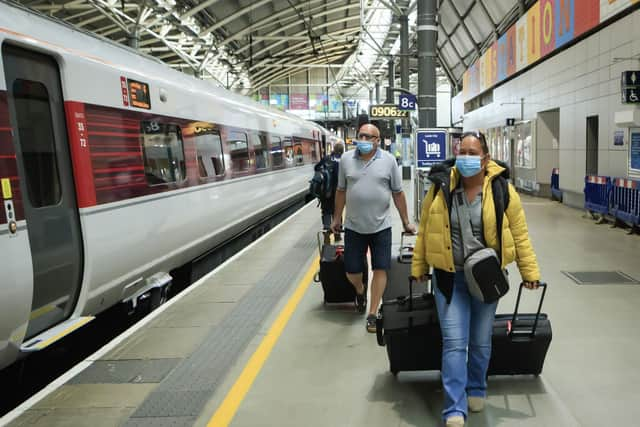Yorkshire passengers 'may not be psychologically ready' to get back on trains, says Northern boss Richard George
and live on Freeview channel 276
Richard George said he was worried about the long-term finances of rail operators due to the lack of passengers travelling by train, amid fears it could be up to a decade before demand returns to pre-lockdown levels.
Passenger numbers plummeted from March onwards as the Government advised people to avoid public transport where possible and it has been mandatory for since June for passengers to wear a face covering.
Advertisement
Hide AdAdvertisement
Hide AdSocial distancing restrictions mean trains could only carry a fraction of their normal numbers. And though the number of services increased in May and earlier this month, demand for trains is currently around 15 to 20 per cent of pre-pandemic levels.
Mr George, who chairs the public sector operator which runs what used to be the Northern rail franchise, told political leaders attending a meeting of Transport for the North's Rail North Committee today: "We are carrying around a lot of fresh air at the moment, which costs everybody a lot of money."
The former Director of Transport for the 2012 Olympic Games in London added: "As a public transport system, as a mass transit system we want to be carrying people. That's what we're here for.
"But as we stand at the moment, we are treading that balancing act between complying with the regulations on social distancing and providing as much capacity as we can, given that the capacity itself is constrained by by some of the resources we have available to do it.


Advertisement
Hide AdAdvertisement
Hide Ad"The thing that I'm worried about for the long term is the psychology of it for our customers. And the psychology of are they ready to come back, we want them to come back, we can't with the current social distancing but even if we swept away all the social distancing, are they psychologically ready to come back to the railways? And I worry about that because that has a longer term implication."
He was responding to a question from committee member and Cumbria county councillor Keith Little, who said trains in his area were "still virtually empty".
He said that although operators were being encouraged by the Government to put on extra services, he did not know how the "tremendous" extra costs would be paid for with such low passenger numbers.
A report for the committee said that while passenger numbers remain low across the North's railway network, "there has been a steady increase in patronage as lockdown measures have loosened and increased numbers of people return to work".
Advertisement
Hide AdAdvertisement
Hide AdA further "uplift" with more services is being planned for September to coincide with the expected return of schools and colleges.
Leeds City Council leader Judith Blake told the meeting that most people were complying with the order to wear face coverings but confidence was low because passengers did not know what was expected of them.
She told the meeting: "I just can't emphasise enough how important it is to keep repeating the messages about what's happening.
"Talking to so many people their first experience of doing something that they haven't done for three or four months is actually quite daunting. And they don't want to be in a position where they get into trouble or shouted at because they've done the wrong thing.
Advertisement
Hide AdAdvertisement
Hide Ad"I hope the operators are working with communication teams with behavioural sciences, all of the resources that we have available to make it as comfortable as possible for people who are returning.
"Of course the difficulty is that the very first message of 'don't use public transport if you can possibly avoid it' I'm afraid has really stuck.
"And that will continue to present us with problems. I think it's going to take a long time.
"Talking to some operators the predictions in terms of returning to where we were, it could take anything between two and 10 years. It's a really dramatic situation that we're in, but I think the more that people start to go out for other reasons, then confidence grows.
"And clearly, more and more people are using the roads, they're going to become pretty difficult to navigate so it will give an incentive to get people back on public transport again."
Comment Guidelines
National World encourages reader discussion on our stories. User feedback, insights and back-and-forth exchanges add a rich layer of context to reporting. Please review our Community Guidelines before commenting.